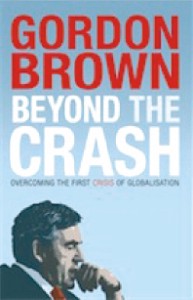| Book Review
A Gripping Self-portrait
ROBERT SKIDELSKY
 |
Beyond the Crash: Overcoming the First Crisis of Globalisation by Gordon Brown Free Press; 336pp |
The phrase "horses for courses" is as valid for politics as for other activities. It's as impossible to think of Gordon Brown at the recent Fifa meeting in Zurich pleading England's cause for the World Cup as it is to imagine David Cameron expounding the nitty-gritty of capital adequacy ratios at a meeting of the G20. When the economic crisis erupted in 2008-9, Brown, like Churchill in 1940, was the right man in the right place at the right time. He'd had 10 years as Chancellor of the Exchequer. He'd read widely and thought deeply about economics, finance, globalisation. He was the one national leader who came to the crisis with a plan and the authority to push it through.
This is his story of how he did it, told soberly, clearly, compellingly. It is not a defence of his premiership, but his personal account of a heroic moment in it. He does not claim credit for "saving the world", but lets the story speak for itself, and praises the contribution of his own team and the other world leaders. It is an interrupted story, because he did not survive long enough politically to finish the job. Since he left the scene, efforts to co-ordinate recovery policies have fallen to pieces. This is the measure of his achievement and the hole that his departure left.
His finest hour was in the seven months following the collapse of Lehman Brothers in September 2008, when the world economy was in freefall, and during which he became its de facto leader. He was clear about what had to be done: first the banking system had to be rescued by a large injection of capital; then the economy had to be restarted with a huge stimulus. To work, both steps needed to be co-ordinated with the other main countries. His mantra was (and is): "Global problems need global solutions." He filled the leadership gap at a moment when, from a mixture of ignorance in Europe and political interregnum in the US, no one else could.
At first Brown, like most others, thought that the banking crisis was caused by illiquidity, an inability by banks to raise overnight cash to meet their current liabilities because of impaired mortgage assets. When huge global injections of cash in 2007-8 failed to revive bank lending, Brown became convinced that the problem was, in fact, one of solvency. Banks had been lending recklessly with insufficient capital, and then denying or covering up their losses. "Recapitalisation" (or partial nationalisation) of the banks in return for full disclosure of losses was the only way to prevent a collapse of the banking system.
His second signal act of leadership was at the G20 meeting in London in April 2009. Recapitalisation had saved the banks, but had not restarted bank lending. Brown spent his family's summer holiday in 2008 reading up on the Great Depression, and this persuaded him that a massive, co-ordinated "stimulus" package was needed to revive the "real" economy.
This is an intense book with few revelatory moments. The reader would not gather that while Brown was busy saving the world, his domestic political position was crumbling. For an instant account of the Brown premiership, you will need to turn to Anthony Seldon's and Guy Lodge's Brown at 10.
Brown follows other fallen leaders in being more admired abroad than at home. He came to care more about poverty in the developing world than in Britain, a right priority for a statesman, but fatal for an elected politician. At a summit in Italy, he brought tears to Berlusconi's eyes and a more practical response from Obama with the story of a boy tortured to death in Rwanda.
The crisis, Brown rightly warns, is not over. The last part of the book, well worth reading for its own sake, is his recipe for the balanced growth of the world economy, with each continent contributing to the recovery. One may question its premise -- that the US and Europe can't replace their "lost output" on their own because they have no alternative to "fiscal consolidation" -- but that's an argument he would relish.
Misled by his success of 2008-9 in stopping the slide into depression, Brown remains too optimistic about what summitry can achieve. His "global compact" for growth, jobs and poverty reduction is a noble vision, to which we may stumble, through many new crises, but may well not. One can only hope that this brave, thoughtful, and decent man, who rose to the highest challenges but slipped on the lower slopes of politics, can find a post-political life commensurate with his abilities, interests, and power to do good.
Copyright
(R) thedailystar.net 2010 |
|
